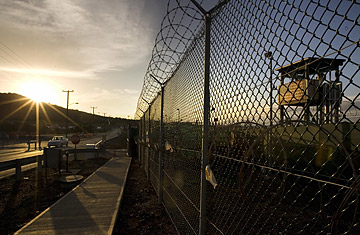
Camp Delta detention compound at Guantánamo Bay
(2 of 2)
What About the Tortured?
While the State Department cajoles foreign governments to take many of the detainees, it will fall to the Justice Department to decide where the rest
of them will be held and tried. Since 9/11, federal courts have convicted 145 people on international terrorism charges vs. just two convictions from Guantánamo's military commissions. The eastern district of Virginia and southern district of New York have a great deal of experience with terrorism
trials.
But federal judges will likely take a dim view of the manner in which many of the detainees were captured and how they were treated at Gitmo. Tricky legal questions abound. For instance, what to do about detainees who confessed under torture? One case sure to be complicated is that of Mohammed al-Qahtani, who allegedly helped plan the 9/11 attacks — he is sometimes described as the "20th hijacker." Bush Administration officials now admit that he was tortured, and Susan Crawford, the retired judge who is the convening authority of the military commissions, has refused to refer al-Qahtani's case to prosecutors.
Eugene Fidell, president of the National Institute of Military Justice, believes the "fruits" of torture will be inadmissible in any new trials. As a result, some detainees held for major acts of terrorism, like the 9/11 attacks, may have to be tried for lesser charges. Says Fidell: "We may wind up in the not entirely satisfying prospect of prosecuting people for offenses other than the things most on our minds — like 9/11 and surrounding claims."
Where to hold the detainees is a more difficult question. A proposal to move some of them to Fort Leavenworth in Kansas met with fierce bipartisan opposition from the state's Democratic governor, Kathleen Sebelius, and its Republican Senators, Sam Brownback and Lynn Jenkins. Other states may prove equally resistant. Sarah E. Mendelson of CSIS says the best solution may be to scatter the Gitmo detainees across several jails. "There's no need for them to be in one place, in one prison," she says.
And finally, the Obama Administration must deal with the political fallout over the decision to close Gitmo; the prison has many supporters in Washington. Pete Hoekstra, the top Republican on the House Intelligence Committee, said the Executive Order "places hope ahead of reality — it sets an objective without a plan to get there. Given the fact that we are talking about trained terrorists and people who have committed acts of mass murder, it would seem the proper course would be to have a plan in place before making this decision." Bush Administration officials will likely join the chorus of criticism.
As a prison and as a controversy, Gitmo has some ways to go yet.
